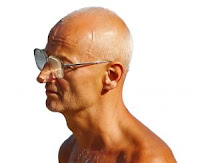 Are you tired of being embarrassed every time just because you are going bald? Does you thinning hair and receding hair line become such a drag? And have you tried every shampoo, conditioner and cream in hopes that you'll get your old thick and shiny hair back? Well, you're just probably doing it all wrong. Because just like any other health condition out there, a healthy diet and the proper nutrition are all you need to kiss those trouble goodbye.
Are you tired of being embarrassed every time just because you are going bald? Does you thinning hair and receding hair line become such a drag? And have you tried every shampoo, conditioner and cream in hopes that you'll get your old thick and shiny hair back? Well, you're just probably doing it all wrong. Because just like any other health condition out there, a healthy diet and the proper nutrition are all you need to kiss those trouble goodbye. Healthy hair, as most of us don't know, depends on how the body can construct a proper hair shaft, as well as having healthy skin and follicles. That is why it has been proven that a good nutrition assures the best best possible environment for building strong and luxurious hair. And here are just some of the adjustments you'll need to once again get that shine that your crowning glory provided you years ago.
Healthy hair, as most of us don't know, depends on how the body can construct a proper hair shaft, as well as having healthy skin and follicles. That is why it has been proven that a good nutrition assures the best best possible environment for building strong and luxurious hair. And here are just some of the adjustments you'll need to once again get that shine that your crowning glory provided you years ago.Iron-rich protein. Protein is a very important nutrient for cell growth, including hair cells. Hair gets its structure from hardened proteins called keratin, and without enough keratin hair grow slowly and the individual strands will be weaker. Also, the iron found in animal protein called heme iron is also good for your hair because they are easily absorbed by the body to be used in the regeneration of loss cells. Iron also helps red blood cells carry oxygen to all cells om the body, including hair follicles. Some of the food rich with these nutrients are clams, oysters, lean beef, turkey, duck, lamb, chicken, pork, shrimp, and eggs. You can also include tofu, soybeans, lentils, beans, and black-eyed peas in your diet to promote more absorption of proteins.
Vitamin C. Vitamin C helps in hair growth by improving the body's ability to absorb iron, which as we have just learned, are very helpful against hair loss. This nutrient also form collagen, structural fibers necessary for the body to maintain integrity by holding it together. Skin, blood vessels and hair follicles all require collagen to stay healthy for optimal growth of beautiful hair. Good sources of Vitamin C are guava, peppers, oranges, grapefruit, strawberries, pineapple, papayas, lemons, broccoli, kale, and Brussels sprouts.
B-vitamins like folate, vitamin B-6, vitamin B-12. These vitamins are the ones responsible in the creation of red-blood cells, which are carriers of oxygen and nutrients to all body cells, including those of the scalp, follicle and hair. Without these vitamins, the cells will not be able to grow and will cause hair shedding, slow growth and weak hair prone to breaking. Foods that are rich with these vitamins includes fortified whole-grain breakfast cereals, garbanzo beans, wild salmon, lean beef, pork tenderloin, chicken breast, white potatoes (w/skin), bananas, and lentils. Shellfish (clams, oysters, crab), wild salmon, fortified whole-grain breakfast cereal, soy milk, trout, lean beef, and low-fat cottage cheese can also be good sources of these vitamins.
Zinc. The mineral zinc is involved in tissue growth and repair, which includes hair growth. It also helps the oil glands around the hair follicles by making sure they work properly. Without these mineral, hair loss can be prone, so is slow growth and the production of dandruff. Oysters, lean beef, crab, ostrich, pork tenderloin, peanut butter, wheat germ, turkey, veal, pumpkin seeds, chicken, and chickpeas are very rich with zinc.
 Good diet and proper nutrition may be good for your hair loss. But these food items can also be of no help, especially with more serious conditions of baldness, including male pattern baldness and baldness due to aging.
Good diet and proper nutrition may be good for your hair loss. But these food items can also be of no help, especially with more serious conditions of baldness, including male pattern baldness and baldness due to aging.But other than those, these tips will definitely help you solve you battle against thinning hair, hair loss and baldness.





No comments:
Post a Comment